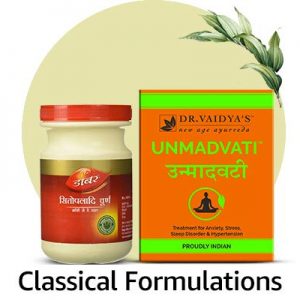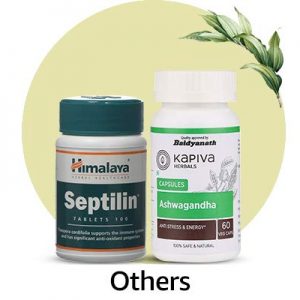
Shop by Product Type






-
-
-
-
-
-
-
-
Traditional Micro Gold plated 2 Layer Golden Ball Mangalsutra Tanmaniya
JewelleryRated 0 out of 5₹999₹109
What is Ayurvedic Medicine? Is Ayurvedic Medicine Safe?
Ayurvedic Medicine or Ayurveda is a natural system of medicine, that was developed in India over three thousand years ago. The word Ayurveda originates from the Sanskrit words Ayur (life) and Veda (science or knowledge). This is why Ayurveda means knowledge of the world. Based on the belief that diseases are caused by the imbalance of stress or imbalance in the consciousness of an individual, Ayurveda encourages certain lifestyle treatments and natural remedies to restore harmony between mind, body, and spirit as well as the natural environment.
Ayurvedic Medicine treatments begin with cleansing the internal organs, then a specific diet, herbal treatments yoga, massage therapy, and meditation.
The notions of interconnectedness throughout the universe, the structure of the body ( Prakriti), and life forces ( doshas) are the main tenets of ayurvedic medical practice. Treatment goals assist the patient by removing impurities, decreasing symptoms, enhancing resistance to illness, reducing anxiety, and enhancing harmony in daily life. Herbs and other plants which include spices and oils are extensively used to treat Ayurvedic Medicine treatment.
Country of India, Ayurveda is considered an alternative to medical care similar to traditional Western medicine and traditional Chinese medicine as well as naturopathic and homeopathic medicines. The practitioners of Ayurveda in India receive state-recognized and accredited training. Presently, Ayurvedic Medicine practitioners are not licensed in the United States, and there is no standard that has been established to be used for Ayurvedic education or accreditation. But, Ayurvedic schools have gained recognition to be educational institutes within certain states.
Ayurveda has positive effects when it is used in conjunction with other therapies in combination with conventional medical treatments.
A lot of Ayurvedic Medicine substances haven’t been studied thoroughly in Western and Indian research. A few of the items employed in Ayurvedic treatments comprise metals, herbs minerals, or other substances that could cause harm if utilized improperly or not under the supervision of a certified practitioner. Ayurvedic Medicine is considered diet supplements, rather than medicines inside the United States, so they aren’t required to be able to meet the safety and effectiveness requirements for conventional medications. These medications can interact with or even counteract those effects that are associated with Western medications. Examine the background and training of the Ayurvedic practitioners that you are planning to consult.
It’s crucial that you discuss the Ayurvedic treatments you’re using with your physician. Women who are nursing or pregnant or contemplating making use of Ayurvedic treatment for children must consult their physician. It is essential to confirm you know that the diagnosis of any medical condition or illness has been confirmed by a doctor with extensive knowledge of conventional medicine and familiarity with treating the illness or illness. Although Ayurveda may have beneficial effects when utilized to treat underlying conditions in conjunction with conventional medical treatment It should not be used in place of traditional medical care particularly when it comes to treating severe conditions.
The people who follow Ayurveda consider that every person is composed of five elements that are which are present in the universe: air, space water, fire, and earth.
They combine within the human body, forming three life forces or energy sources known as doshas. They determine the way your body functions. These comprise Vata dosha (space as well as air); Pitta dosha (fire and water) as well as Kapha dosha (water and Earth).
Every person has a unique combination of the doshas. One is typically stronger than the other doshas. Each regulates a distinct body function. It is believed that the likelihood of becoming sick and also the health problems you experience are correlated with the number of doshas in your system.
Vata Dosha
People who adhere to Ayurveda consider it to be the most potent of the three doshas. It regulates the most basic body functions, such as the way cells divide. It also regulates your brain and breathing patterns, blood circulation, heart function, and the ability to remove the waste that accumulates in your digestive tract. Things that can cause disruption are eating again soon after eating, anxiety, grief, and staying up all night.
Vata Dosha can be your primary life force, you’re believed as more likely to suffer from illnesses like asthma, anxiety and skin conditions, heart disease, and rheumatoid arthritis.
Pitta Dosha
This energy is responsible for how you digest food, metabolism (how your body breaks down food), and hormones linked to your appetite.
Things that can cause disruption include eating spicy or sour food items and spending too long in the sun.
If it’s your source of life, you’re likely that you’re more likely suffer from diseases like Crohn’s disease, cardiovascular illness, high blood pressure, and infections.
Kapha Dosha
This force of nature controls the development of muscle as well as body strength and stabilization, your weight, and also your immune system.
It can be disrupted by sleeping in the morning and eating too many sweets and drinking drinks or food items that contain excessive sodium or water.
If it’s your primary source of energy source, experts believe you’ll develop asthma and other breathing disorders, cancers and diabetes, nausea following eating, or being overweight.
Ayurvedic Medicine or Treatment
An Ayurvedic practitioner will develop an individual treatment plan designed specifically for you. They’ll be mindful of your individual physical and emotional constitution the primary force that drives you and the balance of the three factors.
The purpose of treatment is to rid your body of food particles that are not digested which may remain within your body and contribute to health issues. The cleansing process – referred to as “panchakarma”-is designed to lessen the symptoms you experience and to restore balance and harmony.
To accomplish this, an Ayurvedic practitioner may depend on blood cleansing, massage, herbs, medicinal oils and laxatives, enemas, or enemas.
Does Ayurvedic Medicine work?
There are some states that have approved Ayurvedic institutions across the Country. However, there is no standard national training or certification process for practitioners of this form of alternative treatment.
The FDA does not evaluate or endorse Ayurvedic Medicine. Actually, it has prohibited certain types of Ayurvedic products from entering the US from 2007 onwards. In addition, the organization has warned one five Ayurvedic treatments to contain harmful metals like mercury, lead, and arsenic. The heavy metals could cause serious illnesses that can be life-threatening, particularly for children.
Always consult with your physician before you attempt Ayurveda as well as any alternative treatment.
What Science Says About the efficacy of Ayurvedic Medicine
A few well-designed clinical trials as well as systematic reviews of research suggest that Ayurvedic methods are efficient.
- The results of a 2013 clinical study evaluated two Ayurvedic formulas made of plant extracts against a natural ingredient called glucosamine Sulfate and the medication celecoxib in 440 patients with knee osteoarthritis. The four products all showed similar relief from pain as well as improvement in performance.
- A small and preliminary study conducted by the NCCIH funded in 2011 that included 43 participants showed that both the conventional and Ayurvedic treatments for rheumatoid arthritis were equally successful. The drug that was tested was methotrexate, while the Ayurvedic treatment consisted of 40 herbal substances.
- The results of a brief clinical study involving 89 men and women indicated that a combination comprising five Ayurvedic herbs could help those suffering from Type 2 Diabetes. But other researchers also noted that inadequate study design hasn’t enabled researchers to make definitive conclusions about the benefits of Ayurveda to treat diabetes.
- Turmeric is one of the herbs frequently utilized in Ayurvedic Medicine and can help in the treatment of ulcerative colitis however, the two studies that have reported this were both small. One study which was published in 2005 comprised 10 participants, while the second, which was released in 2006, included an 89-person sample.
What is the science behind Ayurvedic Medicine and the Safety of Ayurvedic Medicine
- Certain Ayurvedic formulations contain minerals, metals, or gems. It is the U.S. Food and Drug Administration warns that the presence of metals in certain Ayurvedic Medicine can be dangerous.
- A 2015 survey published by the American Medical Association of people who used Ayurvedic remedies revealed that 40 percent of them had high levels of lead in their blood and some also had increased mercury levels in their blood. Around one-fourth of the medicines that were tested showed high levels of lead, and nearly half of them had elevated levels of mercury.
- A Case report from 2015 that was published in the Centers for Disease Control’s Morbidity and Mortality Weekly Report linked increased blood lead levels in a woman who was 64 who was using Ayurvedic remedies purchased over the Internet.
- Though it is rare, Ayurvedic products may cause arsenic poisoning.
NCCIH-Funded Research
NCCIH is providing research funding that:
- It builds on earlier studies with breast cancer patients that showed positive effects of integrated Ayurvedic treatment on the quality of life. New research will examine ways to make this therapy simpler to integrate into the lives of people. The suggested Ayurvedic intervention involves diet, lifestyle, yoga, and pressure point therapy.
- Examines the mechanism by that an extract of Butea monosperma (BME) flowers could aid in preventing joint destruction caused by osteoarthritis (BME is used extensively in Ayurveda to treat arthritis and other inflammatory conditions throughout India).
Summary
- Do not use Ayurvedic treatment to delay seeing an ordinary health professional for a medical concern.
- If you are suffering from a medical issue, consult your doctor prior to making use of Ayurvedic Medicine.
- There isn’t any significant regulation of Ayurvedic practices as well as education across the Country, and no state requires practitioners to possess a valid license. For more details on the credentialing process for alternative health professionals, refer to this NCCIH document on Credentialing education, and licensing.
- If you are nursing or pregnant ensure that you speak with the (or the child’s) medical professional as certain Ayurvedic products could contain substances that could harm your health.
- Let all your health professionals about any integrative or complementary treatments you are using. Provide them with a complete description of the ways you take care of your health. This will ensure that you receive the safety and coordination of your treatment.
Is Ayurvedic Medicine Safe?
Certain Ayurvedic formulations could contain mercury, lead, or arsenic in quantities that can be toxic.
Is Ayurvedic Medicine Effective?
A handful of studies suggest that Ayurvedic treatments may lessen discomfort and improve the function of those suffering from osteoarthritis. They also aid in managing symptoms for patients with type 2 diabetes. However, the majority of these studies are not large or well-designed. There isn’t much evidence from a scientific perspective about Ayurveda’s benefits for other health problems.
What are we aware of about Ayurvedic treatment?
While Ayurvedic treatment as well as its constituents have been mentioned in numerous scientific articles but only a few clinical trials utilizing these methods are published in Western medical journals. More than 240,000 American adults are using Ayurvedic treatment.
Eco-Friendly Laundry: How IFB Washing Machine Can Make a Difference!
Amazon Great Indian Sale 2023: Upto 70% Off on Gadgets, Appliances, Fashion, Footwear and more
Rakhi Gift for Brother Under ₹500
Oxidised Jhumkas: Shop Online Silver Gold Oxidised Jhumka Earrings Latest Design for Girls and Women
Flipkart Big Billion Day Sale: Up to 80% Off on Different categories
Amazon Diwali Offer On Mobile 2022 | Up To 70% Off On Smartphones, Mobile Accessories
-
-
-
-
-
-
-
-
Traditional Micro Gold plated 2 Layer Golden Ball Mangalsutra Tanmaniya
JewelleryRated 0 out of 5₹999₹109























